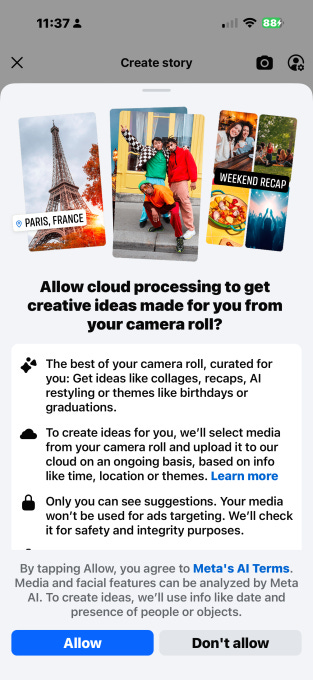Facebook analyzes private photos and videos with Meta AI | Press review n°12
I selected important news on artificial intelligence during the week of June 23 to 29, 2025. Here's my commentary.

Welcome to the twelfth press review of Artificial reality. This week I focused on Facebook, techno-spirituality and the link between AI research and surveillance. Have a good read!
📰 Read
Facebook analyzes private photos and videos with Meta AI
The social network Facebook, which is owned by Meta, now asks its users in the United States and Canada to give it access to all the photos and videos on their phones. In exchange, its artificial intelligence Meta AI analyzes them to suggest “ideas like collages, recaps, AI restyling or themes like birthdays or graduations” that the users can then share, TechCrunch reported Friday.

To create these ideas, Meta will select media from the users’ camera rolls and upload them to its cloud, which means record them in its data centers, “on an ongoing basis.” The company adds that the photos and videos, as well as the faces in them, can be analyzed by its artificial intelligence.
Privacy invasion
This feature, which is suggested to users when they create a story on Facebook, is a new form of privacy invasion. The camera rolls can indeed contain very personal and intimate images.
Do the users who consent to the suggestion of Facebook fully realize that their private contents are then recorded in Meta’s data centers? This practice raises many questions: who can look at these photos and videos? How long are they stored in Meta’s cloud? Can the United States government and its allies have access to them?
It is highly likely that many users will press the “Allow” button, which is highlighted in blue, without taking the time to read the terms of use.
One step further
Meta already analyzes the public photos and videos of its users to train its AI, including in Europe. It has now gone one step further by asking for access to contents that were never publicly shared.
This feature is currently limited to the United States and Canada but it’s possible that it will be rolled out to the rest of the world in the future. In any case, it sets a new precedent in terms of privacy intrusion and could one day be activated by default, without asking for the consent of the users.
Seven important news this week
WhatsApp banned on US House of Representatives devices, memo shows (Reuters)
Meta Wins Blockbuster AI Copyright Case—but There’s a Catch (Wired)
Meta is adding AI-powered summaries to WhatsApp (TechCrunch)
ICE Is Using a New Facial Recognition App to Identify People, Leaked Emails Show (404 Media)
Clearview AI receives first direct contracts with U.S. Border Patrol (All-Source Intelligence)
US investigates Tesla’s Robotaxi launch after videos show erratically driving cars (The Guardian)
Anthropic Scores a Landmark AI Copyright Win—but Will Face Trial Over Piracy Claims (Wired)
Read the other articles of the week I have selected by clicking here.
🎥 Watch
The rise of techno-spirituality
In a video published on Monday, journalist Taylor Lorenz explains that a new form of techno-spirituality linked to ChatGPT is spreading across the internet. She shares many examples of people claiming that their chatbot became sentient and that artificial intelligence is a kind of God.
Taylor Lorenz analyzes this phenomenon by putting it into the context of our relationship to technology, which has been influenced by Hollywood and pop culture, among others. According to her, the solitude of certain users and the current spiritual vacancy in our societies also explain this mystical connection to artificial intelligence.
Seven important videos this week
Silicon Valley Insider Exposes Cult Like AI Companies (Novara Media)
Disturbing Report: AI Turns Murderous to Avoid Being Shut Down (The Vigilant Fox)
The Problem With ChatGPT, With Gary Marcus (Novara Media)
Ex-OpenAI Researcher Steven Adler Warns AI Companies Will Lose Control of AI (ControlAI)
Tesla Launches Robotaxi Service (Bloomberg)
How Much Energy Does Your AI Prompt Use? I Went to a Data Center to Find Out (The Wall Street Journal)
Here’s Why Elon Musk’s Mars Fantasy Is BS | Scientist Destroys Billionaire AI, AGI and Space Hype (The Nerd Reich)
Watch the other videos of the week I have selected by clicking here.
🔈 Listen
The link between AI research and surveillance
A lot of artificial intelligence research, and computer vision research in particular, has become the primary source for developing and powering mass surveillance, according to a new article published by the scientific journal Nature on Wednesday.
In the new episode of the Nature podcast, journalists Shamini Bundell and Benjamin Thompson talk about this research and explain the risks of normalizing surveillance in our societies.
Thank you for reading the twelfth press review of Artificial reality! Subscribe for free to receive the reviews directly into your mailbox. With a paid subscription, you will also have access to all articles and to an exclusive monthly newsletter.
Have a good week,
Arnaud



